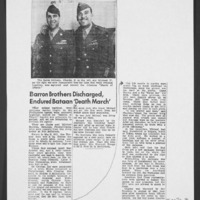-
Title
-
Barron Brothers Discharged, Endured Bataan 'Death March'
-
Date Created
-
1946-04-06
-
Creator
-
The Bethlehem globe-times. (Bethlehem, Pa.) 1925-1977
-
Identifier
-
ww2-1039
-
Description
-
Clipping extracted from The Bethlehem globe-times pertaining to WWII military personnel from the Lehigh Valley, part of the BAPL WWII Newspaper Clipping Collection.
-
Digital Format
-
application/pdf
-
Clipping
-
Language
-
English
-
Publisher
-
Bethlehem Area Public Library
-
Contributor
-
Entries added in 2013 funded in part with Federal Library Services and Technology Act (LSTA) funds from the Institute of Museum and Library Services, administered by the Office of Commonwealth Libraries.
-
Date Submitted
-
2013-04-01
-
Type
-
Text
-
content
-
April 06, 1946
Barron Brothers Discharged, Endured Bataan ‘Death March’
Served Together – Discharged Together
[PHOTO]
[CAPTION] The Barron brothers, Charles, 30, on the left, and Michael, 27, on the right, who were inseparable from the time they went overseas together, were captured and endured the infamous “March of Death.”
[ARTICLE] They enlisted together, went overseas together, fought in the Philippines together, endured the “March of Death” together, were prisoners together, and are now returning to civilian life together.
They are Charles and Michael Barron, Bethlehem, Pennsylvania, who were separated from the Army today at Fort McPherson.
Sworn in May 20, 1941, the Barron boys were in the States less than a month before being sent over to Manila for training. Later they were sent to fight the Japs on Bataan
There they remained until that fateful day, April 9, 1942—almost four years ago—when they were captured and made to march, with death all around them, to the infamous Camp O’Donnell. Later it was Cabanatuan, were treatment was just as bad.
In October, they were separated for a while. Michael remained at Cabanatuan, while Charles was sent to Mukden in Manchuria (recently in the spotlight because of Russian occupation and withdrawal, leaving Chinese Communists and Nationalists to fight it out for possession of the town while plague and starvation raged.)
Mukden was even worse than the others. It was 30 degrees below zero and the men, used to tropical climates, died like flies that first winter.
The 250 unable to survive were stored like so much cordwood in warehouses, since the ground was too hard to dig graves. Came Spring, and a big “burial day” was held. Three days previous, the GI’s were digging graves up on Mukden Hill three miles from camp. There they buried their dead, carrying them on foot in wooden caskets (made by the GI’s) and placing ten men in each grave.
“It was orderly and neat,” said Charles—“about the neatest thing they ever did. The graves were all marked with crosses and names, and dog-tags were on the markers. After our liberation, we held a mass memorial service up there with a priest officiating.”
In the meantime, Michael had been transferred to Niigata, North of Tokyo, where the treatment was far from good. He worked in a coal yard, suffered a number of bombings and all the other privations that go with being a prisoner of the Japanese.
Both men said that the Red Cross got a few packages through to them, but on the whole, the stuff was confiscated by the Japs or they allowed it to spoil.
Withholding the packages was one form of punishment for minor offenses. At one time in Mukden, the food from the Red Cross was kept in a warehouse over a long period. When the Americans bombed the city, the warehouse and its contents were destroyed.
American Red Cross representatives were allowed to inspect the camps on rare occasions, but the GI’s were not allowed to speak to them.
Charles was liberated by the Russians in August of 1945, four days after American Army officers parachuted to the camp to take control. ON the way home, Charles met some men who knew Michael and got his first word from his brother since their separation.
He was told Michael was living and was all right.
Michael was liberated by the Americans the following month and only after he arrived home in October did he hear that Charles had been liberated and that he too had come through okay.
The brothers, who were formerly employed by a steel plant, have no immediate plans except to get into that civilian suit. They live with their sister, Mrs. Kenneth Kresge of 337 S. New St. in Bethlehem.
